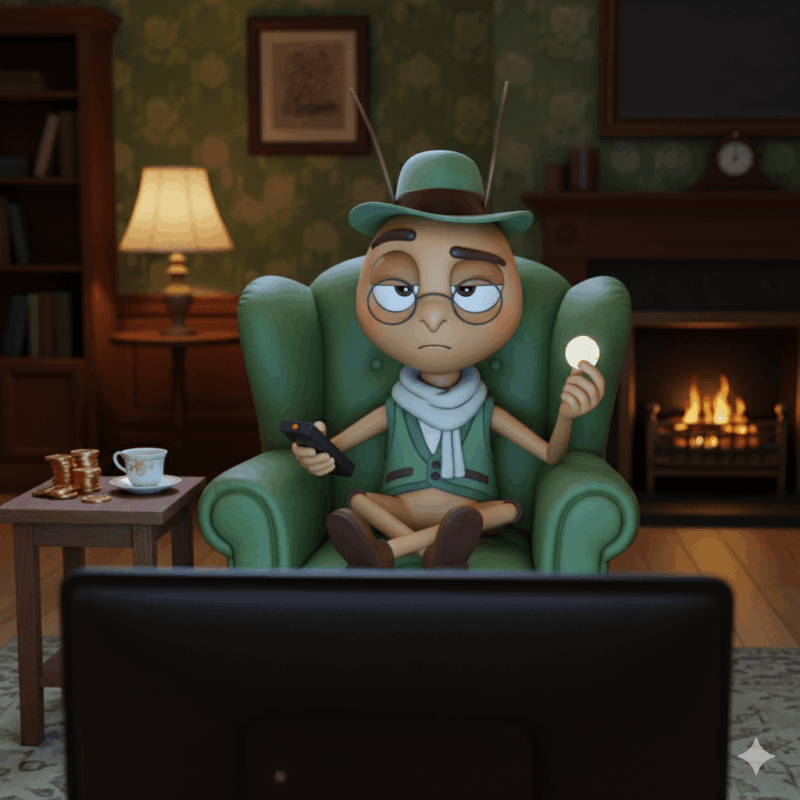Read time: 12 minutes
Quick Summary: You spend your life tokens every day, one hour, one choice, one habit at a time. Most of us drift through dozens of them without noticing. This guide helps you see where they’re going, what they’re really buying, and how to start spending them on what truly matters. How to stop wasting time.
Quick Takeaways: How to Stop Wasting Time
- Identify autopilot habits — notice which habits drain you vs. restore you
- Redefine rest — ask “how do I feel after?” to distinguish numbing from recharging
- Trade one token — swap one habit this week for something that fills you up
- Track small wins — progress over perfection, one conscious choice at a time
- Practice intentional living — spend your life tokens on what actually matters

You probably spent over 200 hours last year on something you didn’t choose, and if you want to stop wasting time, you need to see where those hours actually went.
You didn’t plan it, you just kind of… drifted into it.
Maybe it was scrolling or it was a habit you’ve outgrown but keep repeating. Maybe it was saying yes when you meant no, or filling every quiet moment with noise so you didn’t have to feel anything.
Whatever it was, it cost you.
Not money. Time. Energy. Presence.
It’s one of the biggest time management challenges of 2025: how to stop wasting time on autopilot habits and start living intentionally.
Steven Bartlett calls them life tokens those little chips that represent the hours and moments of your life. Once you see how many you’ve used and how few you have left, you start to look at time differently.
It’s confronting. But it’s freeing too.

This Idea Is 2,000 Years Old (And That’s Why It Works)
Bartlett didn’t invent this concept, he revived it for a modern audience. Nearly 2,000 years ago, the Roman philosopher Seneca wrote an entire essay that could be titled The Diary of a CEO: Ancient Edition.
In On the Shortness of Life, Seneca warned:
“It is not that we have a short time to live, but that we waste much of it.”
He argued that most of us guard our money carefully but spend our time carelessly. Each moment wasted, he said, is a coin lost from a finite purse. We protect our property with locks and guards, yet give away our hours to anyone who asks.
Seneca wrote:
“You are living as if destined to live forever; your own frailty never occurs to you; you don’t notice how much time has already passed.”
That hit me hard. Because I wasn’t wasting money. I was wasting minutes. Quiet hours I’ll never get back.
The philosopher Ryan Holiday, who has spent years translating and teaching Stoic wisdom, puts it simply: “Time is our most irreplaceable asset — we cannot buy more of it. We can only strive to waste as little as possible.”
In other words: you’ve already spent more tokens than you think. So spend the rest with intention.
Because once you realize every hour, every scroll, every small habit is a token spent, you start asking:
What am I really trading my life for?

The Autopilot Habit That Was Wasting My Time (And How I Finally Stopped)
Evening. The house is quiet. I’m on the couch with the remote, scrolling through options I’ve already watched. Nothing looks good, but I press play anyway.
Three episodes later, I realize I haven’t actually been watching. Just staring. The glow of the screen. The voices filling the silence. My partner already asleep beside me.
I’m not even enjoying this. I’m just… here. Waiting for the tiredness to win so I can justify going to bed.
This was my routine. Not because it inspired me or taught me anything. Not even because I particularly enjoyed it. Just because it was what I did. A way to fill the space between work and sleep.
I told myself I deserved it. And I did deserve rest — we all do.
But one day I did the math.
Four hours a week. Over 200 hours a year. Five full work weeks of my life spent on something that left me feeling emptier, not fuller.
Five weeks I could’ve spent learning, exploring, laughing, walking, connecting. Five weeks where I could’ve been present instead of just passing time.
That’s when it hit me: I wasn’t resting. I was numbing.
And numbing out and recharging aren’t the same thing.
You Probably Have One Habit That’s Wasting Time Too — Here’s How to Stop
We all have them. The “default” ways we fill the quiet hours that keep us from learning how to stop wasting time effectively.
For some, it’s rewatching the same comfort show for the third time — not because it’s good, just because it’s there. For others, it’s doomscrolling, online shopping, saying yes to every request, staying in conversations that drain you, or working late not because you need to, but because you don’t know how to stop.
Maybe you’re reading this and already thinking, “But I enjoy scrolling. Is it really wasted if it helps me unwind?”
And that’s fair. There’s nothing wrong with rest. The question isn’t whether you deserve downtime — you absolutely do.
The question is: How do you feel after?
Lighter, or heavier? More yourself, or less? Recharged, or just… gone?
That’s the difference between rest and numbing. And you already know which one you’re doing.
Time Management Reality Check: What Are You Really Buying?
Let’s do the math together.
If you spend four hours a week on something that doesn’t lift, teach, or restore you, that’s over 200 hours a year.
That’s five full workweeks of your life.
Five weeks you could spend learning, exploring, laughing, walking, creating, connecting, or just being still in a way that actually fills you up.
If you’re feeling a wave of regret right now — “God, how many weeks have I already lost?” it ok take a breath.
You weren’t wasting your life. You were just… not choosing it.
And that’s different. Because the moment you start choosing, everything shifts.
You don’t have to make up for lost time. You just have to start spending the tokens you still have.
When you see it that way, your time becomes something to protect — not something to fill.
And that’s where change begins.
What About “Guilty Pleasures”? Are They Really Wasting Time?
Here’s the thing: not all rest looks productive, and that’s okay. Understanding how to stop wasting time isn’t about eliminating every moment of rest.
Watching a show you love? Going down a YouTube rabbit hole because it genuinely fascinates you? Lying on the couch doing absolutely nothing because your body needed it? That’s not waste. That’s chosen rest.
The difference isn’t what you’re doing. It’s why, and how you feel after.
If you finish your evening and think, “That was exactly what I needed,” good. That’s a well-spent token.
But if you finish and think, “Where did the time go? Why do I feel worse?” that’s the signal. That’s the habit worth trading.
Here’s what nobody tells you: rest and numbing look identical from the outside. Same couch looking at the same screen. Same posture. The only difference is what they leave behind.
Numbing leaves you heavier. Rest leaves you lighter.
You don’t have to justify your rest. You just have to notice whether it’s actually restoring you.
The Moment Everything Changed
One evening, I made a different choice that would teach me how to stop wasting time for good.
Instead of reaching for the remote, I grabbed my coat. No plan. No destination. Just motion.
I walked through my neighborhood as the light faded. Noticed things I usually missed. The way the air felt cooler. The sound of someone laughing through an open window. My own thoughts, finally loud enough to hear.
Twenty minutes in, something shifted. I felt awake again. Not tired. Not numb. Awake.
It wasn’t dramatic. No lightning bolt of clarity. Just a quiet realization: this felt different. Better. More like me.
That one walk became two. Then three. Sometimes I’d listen to a podcast that actually interested me, othertimes I’d sit with a book. Sometimes I’d just sit.
The difference built quietly — but it was real.
Because I wasn’t just spending time anymore. I was investing it.
And for the first time in years, my evenings felt like mine again.

What Changed When I Learned to Stop Wasting Time (The Real Numbers)
Here’s what actually happened when I started trading tokens and finally figured out how to stop wasting time on autopilot:
Week 1: I swapped one evening. Walked instead of watching. Felt good, but skeptical — is this really going to stick?
Week 3: Three evenings redirected. I stopped needing that afternoon coffee to push through the slump. The fog that used to hit around 3pm just… lifted.
Week 6: I realized I hadn’t turned on the TV in five days. Not because I was forcing it — I just didn’t want to. My brain felt clearer. My sleep felt deeper.
Week 10: My to-do list stopped haunting me at bedtime. I was actually doing things that mattered during my evenings instead of just thinking about them while half-watching something I’d already seen.
It wasn’t about becoming productive. It was about feeling present.
I stopped moving through my evenings like a ghost and started showing up in my own life.
How to Stop Wasting Time: Small Habit Changes for Busy People
You don’t need to quit your favorite show, delete social media, or become some hyper-optimized productivity machine. That’s exhausting and nobody lives like that anyway.
You just need to ask yourself: What’s one token I’m spending on autopilot that I’d rather spend on something that actually fills me up?
One habit. One evening. One choice.
That’s all it takes to start. And if you’re wondering what to spend your tokens on instead, finding your ikigai — your reason for being — can help you identify what truly energizes you and gives your life meaning.
The 7-Day Challenge to Stop Wasting Time and Start Choosing
You don’t need a month-long program or a complicated system. Just seven small steps — one per day, or spread across a week — to start spending your tokens intentionally.
Day 1: Count Your Tokens
Spend today tracking where your hours go. Not to judge yourself, but to see. Notice which activities feel automatic or unsatisfying versus energizing and meaningful. Use a notes app or a piece of paper — whatever’s easiest. This is the foundation of learning how to stop wasting time.
Why this matters: You can’t redirect what you can’t see. Awareness is always the first step. This is where practicing mindfulness for beginners can help you notice patterns you’ve been missing.
Day 2: Identify One Autopilot Habit
Look at your tracking from yesterday. Pick one habit that’s costing you — the one that, when you think about it, makes you feel a little heavy. Write it down.
Not five habits. Not everything you want to fix. Just one.
Why this matters: Small changes compound. Starting with one makes success achievable, not overwhelming.
Day 3: Choose an Easy Swap
Don’t overcomplicate this. Learning how to stop wasting time starts with one simple swap for your autopilot habit:
- IBefore bed → read 10 pages of something you’ve been meaning to read
- Instead of another rerun → listen to a podcast that lights you up
- When something drains you, say no and take a walk instead
- Instead of filling every quiet moment → sit with it for five minutes and see what comes up
Try it once. Just once. See what happens.
Why this matters: Action creates data. You need to experience the difference to believe it’s worth it.
Day 4: Notice the Return
After your swap, pause and reflect: How did that feel? Did it give you energy, joy, or clarity? Was it easier or harder than expected? What would you do differently next time?
Write it down — even just a sentence or two.
Why this matters: This is your proof. When you notice the return, you start trusting that intentional choices feel better.
Day 5: Redefine Rest
Make a list of what true rest means for you — what leaves you actually refreshed rather than drained or numbed out.
Then schedule at least one nourishing rest activity this week. Put it in your calendar like an appointment with yourself.
Why this matters: Rest isn’t the problem. Unconscious numbing is. When you know what actually restores you, you can choose it more often.
Day 6: Commit to One Small Intention Daily
Before you start each day this week, jot down one way you’ll spend a token with intention.
It can be tiny: savoring coffee without a phone, giving full presence during a conversation, taking three deep breaths before checking email.
Why this matters: Daily intention builds momentum. One conscious choice per day is 365 conscious choices per year.
Day 7: Reflect and Celebrate Progress
At week’s end, review: What went well? What did you learn? What’s one small win?
This isn’t about perfection — it’s about proof that you can choose. And you just did.
Why this matters: Celebrating progress — even tiny progress — rewires your brain to keep going. You’re building evidence that change is possible.
What If You Try This and Fall Back Into Old Habits?
You will. At least once. Maybe more. Learning how to stop wasting time isn’t about never failing.
And that’s fine. This isn’t about perfection. It’s about direction.
If you trade one token this week, then fall back into autopilot for three days, you’re still one token ahead of where you were.
Progress isn’t linear. It’s just consistent. You don’t have to get it right every time — you just have to keep choosing.
The Uncomfortable Truth Nobody Mentions About How to Stop Wasting Time
Here’s something most people won’t tell you when teaching you how to stop wasting time: sometimes the task that feels most aligned with your values is actually avoidance.
You spend two hours organizing your productivity system because it feels like progress. and research the perfect morning routine instead of just starting yours. You “rest” by scrolling because it feels easier than sitting with what’s actually bothering you.
I’ve done it. Spent hours on things that looked like they mattered — meal prepping “for my health,” journaling “for clarity,” researching “for growth” — when what I really needed was to do the harder thing I was avoiding.
Have that conversation. Make that call. Sit with the discomfort. Stop optimizing and start doing.
Sometimes the most aligned choice is the one that makes you uncomfortable. If you’re curious about whether your daily actions actually reflect what matters to you, the alignment habit can help you connect your values to your everyday choices.
That’s how you know it matters.

Intentional Living Tips: Everyday Mastery Steps You Can Take Now
You don’t have to make every hour profound. Just a few more conscious ones will shift how life feels.
- Start with awareness. Notice what feels like a deposit and what feels like a withdrawal.
- Redefine “rest.” True rest restores energy, not drains it. Ask yourself: what activities actually do that for you?
- Practice intention. Before each new day, decide one way you’ll spend your tokens meaningfully — even if it’s a small act of presence.
- Document small wins. Keep a note on your phone or in a journal. When you spend a token well, write it down. Over time, you’ll see the pattern shift.

Mr Critic Moment:
“So you’re saying my life tokens might just be spent on something small?”
Yes. And that simplicity is exactly what your Inner Critic struggles with. It prefers complicated answers that justify staying stuck.
Try whispering back: Maybe it’s small on purpose. Maybe it’s enough.
And if you don’t have that critical voice, it might show up differently — not as words, but as a feeling, a vague unease that hovers whenever you move toward something real.
Journaling Prompts:

What does this problem feel like in my body and mind right now?
Which habit quietly costs me the most energy — and what would I rather spend that token on?
When was the last time I felt truly present instead of just passing time?
If I only had 1,000 tokens left, would I spend them differently tomorrow?
But What If Nothing Really Matters?
You might be wondering: “But what if there is no ‘right’ way to spend my time? What if it’s all just… arbitrary?”
Maybe it is. Maybe there’s no cosmic judge tallying your hours.
But here’s what I know: You feel better when you choose.
Not when you optimize. Not when you hustle. But when you’re awake to your own life — when you decide what matters and spend your tokens there.
That’s not about morality. It’s about presence. About being here, in your one life, instead of drifting through it.
And that? That feels better.
Frequently Asked Questions About Stop Wasting Time & Intentional Living
How do I stop wasting time?
Start by noticing where your time actually goes. Write down your habits for a week — not to judge yourself, but to see what’s costing you energy. The first step to stop wasting time is always awareness. Then trade just one autopilot habit for something that restores you. That’s how habit change starts: one conscious choice at a time.
What are life tokens in personal development?
Life tokens are a metaphor for the limited hours and energy you have. Every choice, habit, or moment is a token spent. Once you see your time this way, you start asking: what am I really buying with these tokens? That shift in perspective makes intentional living feel urgent — and possible.
Is it possible to waste time and still be happy?
Not all rest looks productive, and that’s okay. The question isn’t whether you’re “wasting” time — it’s whether you’re choosing it. If you finish your evening feeling lighter and more yourself, that’s time well spent. But if you feel emptier or regretful, that’s the signal to trade the habit for something better.
How can I avoid procrastination and build better habits?
Start small. Don’t overhaul your life — just redirect one token at a time. Swap scrolling for a podcast. Trade a rerun for a walk. Notice how you feel after. Small habit changes for busy people work because they don’t require willpower — just awareness and one conscious choice.
What are the best time management tips for 2025?
Focus on intentionality, not optimization. Track where your time goes, redefine what “rest” means for you, and practice small, consistent choices. Progress over perfection is the key to sustainable habit change and self improvement.
3 Actions You Can Take Today
1. Count your tokens.
Write down where your hours went last week — not to judge yourself, but to see what you’re actually buying with your time. What got your best energy? What left you feeling emptier?
2. Trade just one — here’s how.
You don’t have to overhaul your evening. Just pick one small swap this week:
- Before bed, swap scrolling for 10 pages of something you’ve been meaning to read
- Trade another rerun for a podcast that lights you up When something drains you, say no and take a walk instead
- Next time there’s a quiet moment, sit with it for five minutes and see what comes up
One trade. One evening. Notice how you feel after.
That’s your signal.
3. Notice the return.
Did you feel more present? More energized? More you? That’s what a well-spent token feels like. Write it down. That’s your proof that this works.
This Is Your Permission Slip
You don’t need to overhaul your life tomorrow. You don’t need to become someone you’re not. Learning how to stop wasting time doesn’t require perfection.
You just need to start choosing instead of drifting.
One token at a time.
Because a year from now, you’ll either have spent your tokens the same way… or you’ll have started spending them on what matters.
The difference starts with one evening where you decide: not tonight. Tonight I’m spending this token on something that actually fills me up.
Disclaimer: I’m a coach, not a clinician. What I share comes from real practice and personal growth, not therapy. If you’re finding things hard, it’s okay to get professional support — it makes a difference.
If you enjoy reflections like this, you can join the Everyday Mastery newsletter here — calm, practical insights sent straight to your inbox once a week. Want more time management tips, habit change strategies, and intentional living insights delivered weekly? This is where we practice progress, not perfection.
If you enjoy these posts and want to support the writing, you can buy me a coffee — it keeps the kettle (and the ideas) warm
This is your permission slip to start messy. We don’t chase perfect here — we practice progress.
Kel is the writer behind Everyday Mastery, where she shares the real, messy, and meaningful process of building habits, resilience, and self-belief from the ground up. Her writing blends ancient philosophy with modern science, always focused on small, practical steps that lead to lasting





